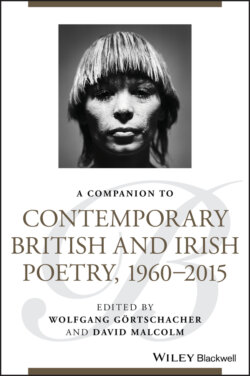Читать книгу A Companion to Contemporary British and Irish Poetry, 1960 - 2015 - Группа авторов - Страница 62
Genre
ОглавлениеRalph Cohen (2014, 53) observes that “[t]he term genre is relatively recent in critical discourse.” Genre has only been described as such since the nineteenth century. Prior to that, as Cohen writes, “the terms used for it were ‘kinds’ or ‘species’.” He continues:
Genre has its source in the Latin genus which refers in some cases to “kind” or “sort” or “class” or “species.” […] Its root terms are genre, gignere – to beget and (in the passive) to be born.
Genus mutated into genre via classifications of sorts and species. The organic roots, as it were, of genre are germane to this current chapter that contends that many genres in contemporary British and Irish poetry are hybrids, mostly sharing a similar genus, but which split off into species. Summarizing the various theories of the development of lyric as a genre in the introduction to the section on “Genre Theory” in their The Lyric Theory Reader, Virginia Jackson and Yopie Prins (2014, 14) register the inherent binary conflict in genre theory of the lyric between considerations of “whether the lyric is historically contingent and ephemeral or is dependent on norms and structures continuous across periods and cultures.” In order to define a specific genre of poetry, we need to consider whether we approach particular genres as having developed out of specific historical conditions and being subject to a whole range of cultural, social, and political developments, or whether we define specific genres structurally, by identifying formal features marking these genres as distinct.
A comparison of essays in The Lyric Theory Reader illustrates the clash between the contingent and the structural in genre theory. Cohen's conclusions, for example, are revised and refined by Jonathan Culler (2014) in a piece entitled “Lyric, History, and Genre.” Noting an element of defeatism toward the empirical classification of ahistorical characteristics of certain genres in Cohen's arguments, Culler uses the example of the lyric to show that identifying continuities in genres can be useful (he cites “apostrophe” as characterizing lyric's uniqueness). However, while Cohen and Culler differ in their relative emphasis on history and empirical classification, both describe the development of genres as an organic production of species or subgenres. “Even for Aristotle,” Cohen contends, “generic markers are not absolute; they indicate stages through which genre passes.” He continues:
A genre does not exist independently; it arises to compete or to contrast with other genres, to complement, augment, interrelate with other genres. Genres do not exist by themselves; they are named and placed within hierarchies or systems of genres, and each is defined with reference to the system and its members.
(55)
Cohen's model is one of organic and competitive development as well as cross‐fertilization and hybridity; all characteristics comprising poetry in Britain and Ireland over the last 60 years. Culler (2014, 66) defends a more structuralist position, but nevertheless also presents a dynamic model of genre:
A claim about a generic model is not as assertion about some property that all works that might be attached to this genre possesses. It is a claim about fundamental structures that may be at work even when not manifest, a claim which directs attention to certain aspects of a work, which mark a tradition and evolution, that is to say, dimensions of transformation.
Generic models and writing about genres relate to the task of capturing “fundamental structures” even as they mutate and transform. “[C]ertain aspects of the work” will mark it out as representative of a particular genre, but a critic must be aware of the processes of evolution (and thereby the transformations and shifts of species) at work. As Culler continues: “A test of generic categories is how far they help relate a work to others and activate aspects of works that make them rich, dynamic and revealing” (66). Genres of poetry, or species as I wish to call them, interrelate and reveal aspects of each other. Identifying genres is difficult, as individual works must inform any definition of genre or species. Yet, identification of “generic categories” will inevitably occlude the specificity of particular poetries, as well as exclude many others. Hence, the word species will be used here to capture the dynamism and change of poetic genera that both Cohen and Culler are eager to acknowledge. Thus, positioning itself between the categorizing instinct of poetics and historical and contingent acknowledgments of literary history, the rest of this chapter will examine the evolution of certain species of contemporary British and Irish poetry.
